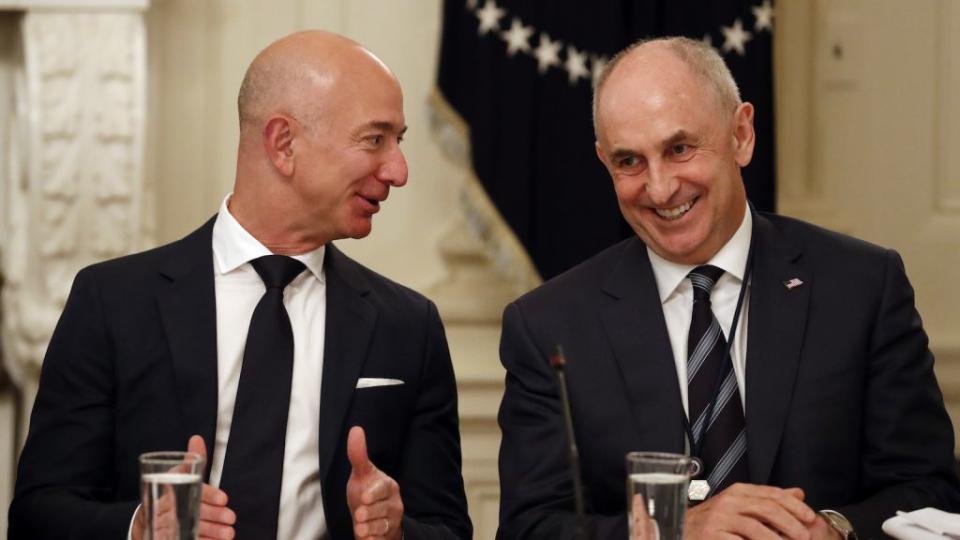The US should treat its citizens like Amazon treats its customers

Amazon and the Oval Office have more in common than you’d think.
The preamble to the United States constitution begins with “We the people.” Similarly, Amazon’s mission statement begins “Our vision is to be earth’s most customer-centric company.” Same/same but different, right?
While Amazon is successfully living up to its promise of being consumer driven, government agencies continue to fall short. The White House should push to replicate Amazon’s customer-first strategy and deliver on their mission to serve their constituents just as well as Jeff Bezos serves his.
Over the years, Amazon has cemented itself as the king of commerce by providing personalized, efficient digital experiences and outstanding customer service. According to its personalization team, Amazon is “obsessed” with creating experiences that cater to the distinct interests of each individual shopper. From the moment you arrive at amazon.com all the way through to the final checkout, you’re treated as an individual. Meanwhile, citizen-government interactions continue to be plagued by outdated tech and clunky web designs that don’t accommodate for personalization. My Amazon experience is not the same as yours, and my government experience should not be the same, either.
Companies like Amazon are focused on improving customer experience by reducing friction. For example, by using Amazon Prime, you can buy a huge suite of products (at any time, from any device, and any location) that can be delivered to your home in less than 48 hours—for free. Yet to obtain a new driver’s license, you need to go to the DMV, fill out a lot of paper forms, and wait in absurdly long lines to do something that would have taken you minutes online. After all that frustration, your new mop will almost certainly arrive before your license, too.
But digitizing government services and making them accessible online is only part of the solution. We could also be utilizing existing technologies in new ways. For example, a child’s birth is recorded by a state agency to issue a birth certificate. That information could be used to email the parents about saving for college using the state’s 529 plan. Uber tells me how long I have to wait for my ride, exactly how much it will cost, and what time I will arrive at my destination. Why are we not providing the same level of service to disabled veterans, such as an estimated time that they will be seen at the local hospital so they can wait in the comfort of their home?
Of course, Amazon provides this level of service with the hope of making money off us instead of us switching to a competitor’s service. The government doesn’t have to supply the same perks to earn our business: It is the only game in town. As governments have no competition, they don’t need to incentivize citizen services. The only way we’ll be able to get them to change is therefore through our votes, not our wallets.
If we elect politicians who are luddites and technophobes, how can we expect government services to improve? As citizens, we should be demanding better services from our government leaders. If we elect politicians who are luddites and technophobes, how can we expect government services to improve? Congress currently only has only four elected representatives with a computer-science degree. That’s 0.7% of congress, whereas the general population is over three times that with approximately 3.1% of all degrees being computer-related. The next time you complain about trying to apply for a fishing license online or finding the opening hours for your local library, remind yourself that next time you vote, you should think about where the candidates stands on applying innovative technology to improving the government experience.
There are pockets of innovation breaking through the bureaucracy to deliver on the mission of citizen-based services. In Georgia, the state government recently announced that their digital team is developing an integration with Amazon’s Alexa, providing access to frequently requested information via a voice-controlled interface. Meanwhile, Los Angeles has deployed an AI chatbot to answer hundreds of commonly asked questions.
You cannot seek government services from alternate providers, but we can collectively ensure that the leaders we put in charge are knowledgeable and tech-savvy. Bezos understands the power of technology and the importance of customer experience. Politicians need to adopt this is the mindset in city halls and state capitols across the country.
Learn how to write for Quartz Ideas. We welcome your comments at ideas@qz.com.

Sign up for the Quartz Daily Brief, our free daily newsletter with the world’s most important and interesting news.
More stories from Quartz:

 Yahoo Finance
Yahoo Finance 